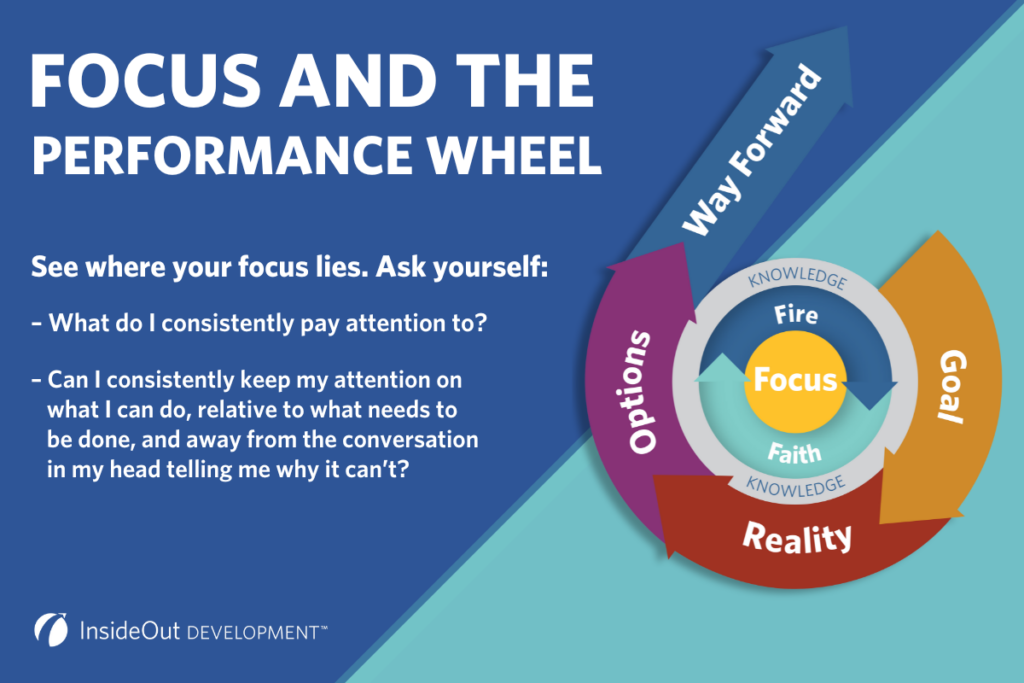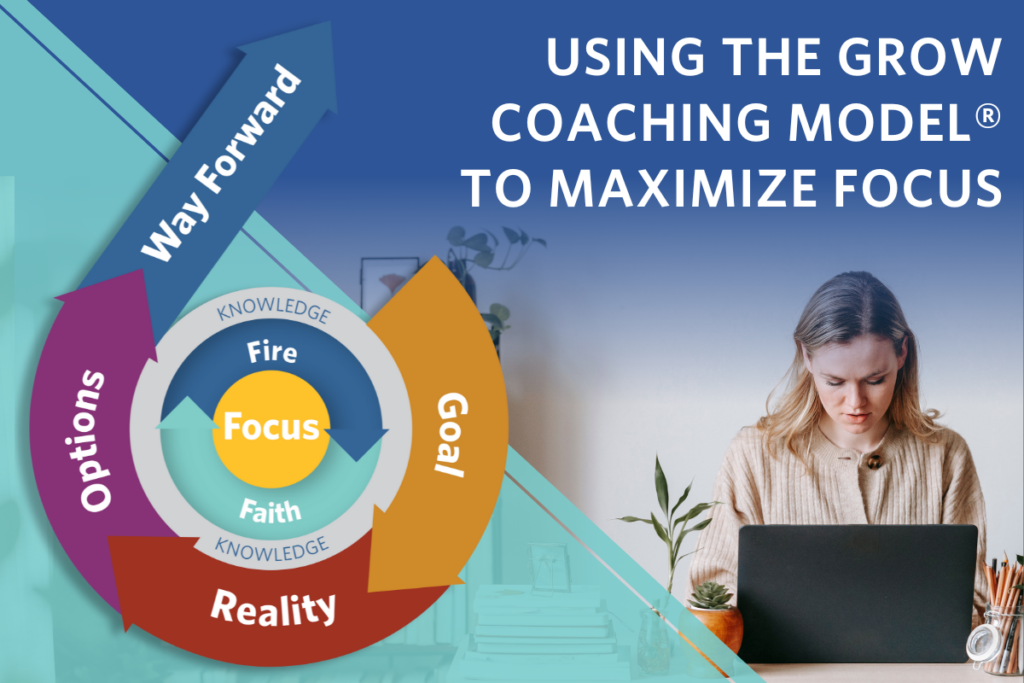Here at InsideOut Development, it’s our belief that every individual has the ability to learn and perform at a greater level. It’s a business leader’s responsibility to draw out this excellence from their team members.
Recognizing the fundamental aspects of performance enables corporate leaders to focus their coaching and optimize its impact. For this reason, we’ve distilled these aspects into what we refer to as the Performance Wheel™.

Focus and the Performance Wheel™

One piece of the Performance Wheel™, Focus is a key element of performance. Focus is about what you pay attention to and how you manage inconsistency and interference that would otherwise negatively impact your performance.
It’s arguably the most important element of performance because it’s the one you have the most control over. Choosing what you focus on drives results because Focus is the starting point for everything you do. To see where your focus lies, ask yourself the following questions:
- What do I consistently pay attention to?
- Can I consistently keep my attention on what I can do, relative to what needs to be done, and away from the conversation in my head telling me why it can’t?
At its simplest level, when people are focused on saying what they’ll do, doing what they say, and communicating to stakeholders when they can’t, the result is better execution, accountability, trust, innovation, creativity, and empowerment — all of which impact engagement.
The Psychology Behind Focus

Our Focus, or drive, is perhaps the most well-researched element of performance.
In the late 90s, several psychologists studied “external focus.” Their results indicated that people performed better when they focused on the outcomes of actions rather than the actions themselves. When people get out of their heads, they are better able to solve problems and increase their performance.
This is an intuitive concept that psychologists have researched for more than 125 years. In 1890, William James suggested that actions are more successful if the performer directs their attention to the “remote effects” of the action (like the intended outcome), rather than the “close effects” (like the feel of the individual elements of the action).
In a simple motor skills learning test, participants were tasked with balancing on a surfboard-like platform called a “stabilometer.” Some participants were asked to focus on their feet to help them keep their balance. Others focused on markers attached to the platform. A third group was given feedback from a computer monitor. Here were the results:
- Participants who focused on their feet (an internal focus) performed significantly worse than the other groups.
- Participants who focused on the markers were able to maintain an external focus which made them more successful in their simple tasks.
- Participants who focused on third-party feedback (even when that feedback was focused on their feet) performed the best.
Researchers deduced that a key function of feedback is to provide an external focus of attention. But an important distinction exists between focusing on feedback and focusing on following instructions.
Focusing on feedback yielded extremely positive results in the “stabilometer” experiment, but in another experiment involving dart-throwing, participants asked to follow specific instructions regarding how to throw their dart yielded worse performance than those who focused on their greater performance objective — simply hitting the target.
But the impact of focus goes deeper than psychology and mental habits. Repeated focus on the right things can create physical changes in the brain.
Authors Jeffrey Schwartz and David Rock explain that “the act of paying attention creates chemical and physical changes in the brain. Over time, paying enough attention to any specific brain connection keeps the relevant circuitry open and dynamically alive. These circuits can then eventually become not just chemical links but stable physical changes in the brain’s structure.”
All in all, Edward De Bono, a British psychologist and physician, said it best: “An expert is someone who has succeeded in making decisions and judgments simpler through knowing what to pay attention to and what to ignore.”
Focus and Flow
When we improve our focus sufficiently, we enter a state in which we are absorbed in the activity. Mihaly Csikszentmihalyi calls it a “flow state.” Our focus acts as a lever enabling us to enter this state at will. When we’re in a “flow state,” we:
- Can lose consciousness of self and time
- Are more creative
- Enjoy our experiences
- Are generally able to perform better
Sports psychologists describe it as being “in the zone.” In his book The Inner Game of Tennis, Tim Gallwey, widely considered the founder of sport psychology, describes the “flow state” as the opposite of anxiety.
He writes, “Anxiety is fear about what may happen in the future, and it occurs only when the mind is imagining what the future may bring. But when your attention is on the here and now, the actions which need to be done in the present have their best chance of being successfully accomplished.”
Using the GROW ® Model to Maximize Focus

When coaches and individual contributors understand Focus and the other elements of the Performance Wheel™, they can identify how to enhance performance and use the GROW Coaching Model to actualize it.
The GROW Coaching Model is a decision-making structure that empowers individuals to make choices, pledge to actions, and yield outcomes. It simplifies intricate decisions into manageable steps, eliminating distractions and enabling performers to hone in on one aspect of decision-making at a time. In other words, the model makes decision-making more strategic.
Focus vs Interference
Picture this…
You stumble into an early-morning meeting ten minutes late, mind racing with questions about why you’ve taken on so much and why no one else in the room seems so frazzled.
You begin mentally transitioning to the topic at hand, only to notice that everyone else has their laptops open — and yours is still sitting on your desk. At home. Ugh! Are they judging you right now? Are you losing credibility as you sit there?
These people clearly lead privileged lives. If only they understood what you’re dealing with! Quick, get up to speed! What did you miss?!
How did you get here? Here’s the reality: You spent most of the night comforting a sick child. You were awoken by an all-too-early alarm for the aforementioned meeting. That meeting will kick off a project that could further your career.
As if the lack of sleep wasn’t enough, there is road construction on the commute, no parking when you arrive, and you can’t believe the news report you’re hearing on the radio. It’s no surprise that your mind was flooded with distracting internal dialogue by the time you sat down.
There are many factors in life that are outside of our control. At InsideOut Development, we call these factors “interference.” Interference is anything that gets in the way of your progress. There are two types: external and internal.
External interference is the stuff that’s happening around you. For example, your child is sick, your company has mandated tighter budgets, your future career path is fuzzy, you’re dealing with broken equipment, etcetera. Unfortunately, you can’t control how it will rear its ugly head, and there’s rarely anything you can do about it.
Internal interference is how the external stuff impacts our mental and emotional state. It’s that internal dialogue in your head preventing you from doing your best work. We are all susceptible to this type of distraction, whether it manifests as a frustrated mental rant, an untrue story about what’s happening, or questioning our own capability.
So, is there any good news? Yes! You can recognize the effects of external interference and choose your focus to prevent it from holding you back. Choose to focus on the work that needs to be done instead of the interference. Choosing your focus is how you take control of — and maximize — your performance.
If you or your team has been struggling with interference, remember this: You have a choice. Will you focus on the dialogue in your head or the action steps to move forward?
Achieve High Performance With Organizational Focus
An organization with Focus has clearly articulated key priorities that lead to the accomplishment of the organization’s purpose, and those priorities are given robust attention on every level.
An organization without Focus is filled with distraction, miscommunication, redundant effort, waste of resources, and poor execution.
Focus can even impact group dynamics. As we identify our focus as a contribution toward a collective goal, we are less likely to experience conflict with our collaborators. This creates more successful cooperation, positive group relationships, and a stronger group identity and cohesion.
Focus is a key driver of performance, but it’s still only one element of performance. Performance is also impacted by:
Discover more about these performance aspects in the above links. You can also download our complimentary guide to gain further knowledge about GROW, the ultimate map for decision-making.{{cta(‘0890ea83-b9c6-4bf2-8e2a-9f1c68b1872b’,’justifycenter’)}}


